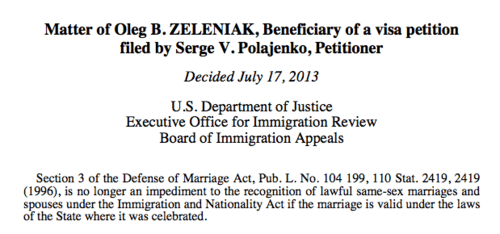Last week, the Board of Immigration Appeals (BIA), the highest administrative body in the Department of Justice that considers immigration matters, ruled in a pending case that same-sex couples' marriages should be viewed in light of where the couple was married (the so-called 'place of celebration rule') rather than the state in which the couple lives (the 'place of domicile rule'). The decision, which will likely hold sway in future cases, brings some clarity to the confusing issue of how and when the federal government will recognize same-sex marriage licenses as valid.
The BIA ruling follows an announcement in late June by Department of Homeland Security Secretary Janet Napolitano, who said her office would opt for the 'place of celebration rule,'–a decision which diverged from previous practices based on where a couple lived but which would have held no sway outside her department. Writing on his blog Art Leonard Observations, New York Law School Professor Arthur Leonard explains the details behind the new decision:
Serge Polajenko, a U.S. citizen, filed a Petition for Alien Relative, called an I-130, on March 10, 2010, on behalf of his husband, Oleg Zeleniak, after the men were married in Vermont. The petition was denied on July 27, 2010, on the ground that DOMA, Section 3, barred immigration authorities from recognizing same-sex marriages. Polajenko appealed to the BIA, which issued a decision on April 18, 2012, sending the case back to the National Benefits Center Director to address two issues: first, whether the Polajenko-Zeleniak marriage was valid under state law, and second, whether the marriage qualifies as bona fide as required by the Immigration and Nationality Act.
The questions posed by BIA are two distinctly separate issues, arising under two different bodies of law. The second concerns the requirement that a marriage be “bona fide,” not a marriage of convenience entered for the purpose of getting a “green card” (authorization to live and work in the United States), but rather a “real marriage” of parties intending to live as spouses.
In its decision, the BIA held that the Supreme Court's ruling in the Defense of Marriage Act (DOMA) case U.S. v. Windsor "removed Section 3 of the DOMA as an impediment to the recognition of lawful same-sex marriages and spouses if the marriage is valid under the laws of the State where it was celebrated." The BIA remanded the case to the National Benefits Center Director to determine whether the marriage was indeed bona fide.
 As Leonard points out, the BIA's ruling in the Zeleniak case now stands as precedent establishing the 'place of celebration rule' as the proper standard to use in immigration proceedings. "Although the BIA did not address the issue directly," Leonard goes on to explain, "presumably the place of celebration rule also extends to marriages between U.S. citizens and foreign nationals that take place outside the U.S., in one of the dozen or so other countries that allow same-sex marriages."
As Leonard points out, the BIA's ruling in the Zeleniak case now stands as precedent establishing the 'place of celebration rule' as the proper standard to use in immigration proceedings. "Although the BIA did not address the issue directly," Leonard goes on to explain, "presumably the place of celebration rule also extends to marriages between U.S. citizens and foreign nationals that take place outside the U.S., in one of the dozen or so other countries that allow same-sex marriages."
Now that the BIA and the Department of Homeland Security are both committed to using the 'place of celebration rule,' same-sex couples' marriages should be recognized for immigration purposes regardless of where they're living. Still, the legal wrangling around the issue demonstrates that complexity will persist until DOMA is fully repealed or the Respect for Marriage Act is passed by Congress.




